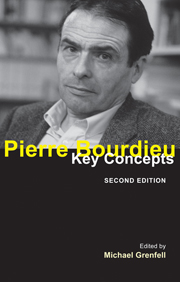Book contents
- Frontmatter
- Contents
- Contributors
- Acknowledgements
- Preface to the second edition
- Introduction
- PART I BIOGRAPHY, THEORY AND PRACTICE
- PART II FIELD THEORY – BEYOND SUBJECTIVITY AND OBJECTIVITY
- PART III FIELD MECHANISMS
- PART IV FIELD CONDITIONS
- PART V APPLICATIONS
- Conclusion
- Chronology of life and work
- Bibliography
- Index
PART IV - FIELD CONDITIONS
- Frontmatter
- Contents
- Contributors
- Acknowledgements
- Preface to the second edition
- Introduction
- PART I BIOGRAPHY, THEORY AND PRACTICE
- PART II FIELD THEORY – BEYOND SUBJECTIVITY AND OBJECTIVITY
- PART III FIELD MECHANISMS
- PART IV FIELD CONDITIONS
- PART V APPLICATIONS
- Conclusion
- Chronology of life and work
- Bibliography
- Index
Summary
Introduction
Throughout this book, the integrated nature of Bourdieu's key concepts has been stressed. They are not single features of social systems but particular foci of the same thing; two sides of the same coin. Nevertheless, it is possible to alight on each individual concept for a particular view of social phenomena, especially with respect to individual aspects of them. Part III addressed four concepts under the title of “Field mechanisms”, and the intention here was to examine terms which highlighted the structure of fields and how they operate according to Bourdieu's theory of practice. The focus here was towards objective mechanisms: the structures, medium of operation and features which arose from their procedures. Part IV of this book now turns towards the more subjective dimensions of fields. Accepting that the objective and subjective are always mutually implicated and expressed, it is nevertheless possible to move our orientation from one side to the other. The four concepts in the present part all deal with the more individual or subjective nature of field conditions; in other words, how fields are present in individuals and their repercussions.
Chapter 9 deals with interest. Here, we consider the way field conditions make for the emergence of particular interests, whether these be class-based or otherwise. The chapter draws out the implications of “interested” actions for both the researched and the researcher, and asks the question, “Can there be such a thing as a disinterested act”? Interests often express the most personal and deeply private, which raise issues of motivation and aim.
- Type
- Chapter
- Information
- Pierre BourdieuKey Concepts, pp. 147 - 150Publisher: Acumen PublishingPrint publication year: 2012

